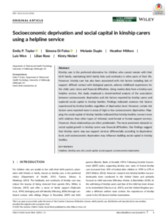Abstract
Kinship care is the preferred alternative for children who cannot remain with their birth family, maintaining birth family links and continuity in other parts of their life. However, kinship care has also been associated with risk factors including lack of support, difficult contact with biological parents, adverse childhood experiences for the child, carer stress and financial difficulties. Using routine data from a kinship care helpline service, this study employed a mixed‐method analysis of the association between socioeconomic deprivation and risk factors reported by kinship carers and explored social capital in kinship families. Findings indicated common risk factors experienced by kinship families regardless of deprivation level. However, certain risk factors were reported more in areas of high or low socioeconomic deprivation. Mapping the social capital of kinship families indicated that kinship families connect more with relatives than other types of informal, semi‐formal or formal support services. However, these relationships are often problematic. The most prominent obstacle to social capital growth in kinship carers was financial difficulties. Our findings suggest that kinship carers may use support services differentially according to deprivation level, and socioeconomic deprivation may influence building social capital in kinship families.

